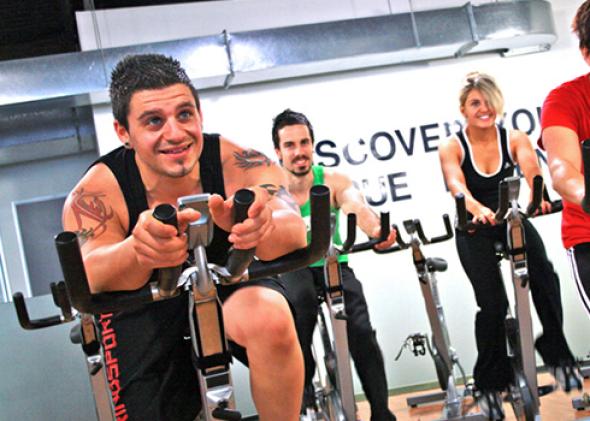
"What's Work Got To Do With It?”
Sweaty bodies, throbbing electronic beats, gyrating lights—just another lunch hour in New York City.

Although summer 2012 introduced urban working professionals to the Swedish trend of noon time dance parties, the number of employees who actually make the effort to pack in a cardio workout during a sedentary workday are few in light of the 130 million office-going Americans.
Fortunately, companies big and small are waking up to the fact that healthier employees not only reduce healthcare costs but also make for happier and more engaged employees—which translates to higher productivity and lower turnover rates. It's an important trend that's further underscored by the impact of the Affordable Care Act on wellness programs: from 2014, employers can actually reward employees for engaging in healthier behaviors.
Such a significant attitude shift is arriving at a moment when new studies on “sitting disease” have only exacerbated the anxiety that has taken hold of the swivel chair crowd. Though it may sound benign, this is actually a pretty serious issue—dramatically increasing risk of cardiovascular disease, diabetes and cancer—and only continues to grow as employees log in more hours of screen time, whether they're in the office or telecommuting from home.
Fitness centers in the office building and healthy vending machines are major improvements to wellness programs from just a decade ago, but some innovative employers are revamping the workplace with exciting incentives and perks. From free yoga classes (Twitter, Airbnb) to treadmill desks and standing desks (a big hit at Google), from free massages (Zynga, Google, Shutterstock) and nap rooms (AOL) to a dog-friendly office (Zoosk)--workplace wellness actually sounds cool now.
But you don't need to be a big-budget corporation with young, tech-savvy employees to implement serious benefits toward holistic employee health. In fact, it's the aging workforce that needs the attention most.
Case in point: San Diego-based Bill Howe Plumbing & Air Conditioning recently collected several awards in the “healthiest business” category for the company's effective implementation of a new health initiative in early 2013. The 125 employees at the family-owned business can now take advantage of full biometric testing, nutrition education, on site fitness training and private wellness consultations. The company also runs 4 to 5 fitness events a month for employees and their families.
As the company's vice president Tina Howe explains: “We are in a labor intensive industry and must take care of our employees. They are our greatest asset. As we are dealing with an aging workforce, we feel that by incorporating a full wellness program, we aim to create an environment that everyone will be able to improve their health now, so they can truly enjoy their lives beyond retirement.“
Beyond encouraging healthy habits, there's much that can be done to promote holistic health at the workplace. Heidi Hudson, program coordinator of the NIOSH Total Worker Health program at the CDC, points out that the most desirable perk sought out by today’s busy and stressed out workers is greater flexibility--giving workers more control over when, where and how they work.
But forget about telecommuting--for ultimate flexibility, how about a “no vacation” policy? Companies like Netflix, Evernote and Morningstar, who already don't track their employees' work hours realized they could apply this concept to vacation time as well. Instead of having to use or lose remaining vacation days in December, employees are trusted to balance and schedule their work and free time as they please.
Other companies like Boeing and Mattel allow paid holidays or time off to accompany one's child on a school field trip. Genesys Cloud even offers a paid day off to employees who want to volunteer in the community.
Although critics of the newer, more holistic wellness programs point out the difficulties in accurately measuring results, experts believe that, regardless of what the incentives are, if employees are happier and healthier in their lives, then that in itself is a significant achievement and will show up over time in the company's own achievements.